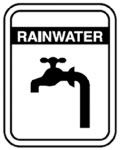Exemptions from the Safe Drinking Water Act
Water supplies exempt from the Safe Drinking Water Act 2011 include:
- drinking water collected or recovered at domestic homes (rainwater or bore water)
- rainwater supplied at low risk premises (for example, short-term accommodation facilities)
- optional rainwater supplies (additional to mains water)
- discretionary sources of water at recreational parks and reservoirs
- boiled rainwater used in small, regulated food premises
- chlorinated on-supplies supplied to one premises.
See the Exemptions fact sheet (PDF 212KB) for more detailed information.
Domestic rainwater or bore water supplies
Information is available to assist with the maintenance of domestic rainwater tanks and determining the quality of domestic bore water supplies (both exempt).
Rainwater supplies at low risk premises
The exemption for rainwater supplies at low risk premises is subject to notification of potential users about the source of the drinking water supply.
Low risk premises include:
- short term accommodation buildings (bed and breakfasts, hotels, caravan parks, camping grounds)
- recreational or community centres
- church and council buildings.
The exemption does not apply where food or beverages are prepared for sale or supply or where the rainwater supplied to vulnerable populations. Exceptions to this include where rainwater is provided at winery cellar doors for drinking (PDF 103KB) and the use of boiled rainwater in small food premises.
While exempt from the Act, a risk management plan (RMP) has also been developed for these settings as adoption of a RMP is considered best practice.
Boiled rainwater
An exemption to the Act was included in the South Australian Government Gazette (Number 10, 2015) (PDF 1.72MB) for the use of boiled rainwater in regulated food premises. This exemption applies to small premises such as roadhouses and cafes that use rainwater for purposes including making tea and coffee and limited food preparation where boiling small quantities of rainwater is practical. The exemption does not apply to the use of rainwater in regulated care or education premises. See the Use of boiled rainwater in food premises (PDF 98KB) for more detailed information.
Chlorinated on-supplies
An exemption to the Act was included in the South Australian Government Gazette (Number 91, 2023) (PDF 2.5MB) for drinking water providers who only supply drinking water to one premises, where the water has been directly supplied by another drinking water provider, and additionally treated with chlorine as a disinfectant.
The exemption applies to premises such as hospitals that chlorinate drinking water, typically supplied by SA Water, to improve the control of micro-organisms, such as Legionella that can grow in plumbing systems within buildings and represent a public health risk to vulnerable patients. While exempt from the Act, it is considered best practice that the operational requirements for managing these supplies are identified in a Risk Management Plan or similar procedural document.
The exemption does not apply to larger, more complex chlorinated on-supplies including those with extended storage or distribution systems (e.g. community supplies). In addition, the exemption is not applicable where water is supplied to multiple premises or users.
See the frequently asked questions for exempt premises (PDF 258KB) for more detailed information.
Signage and notification
 Where exemptions apply to the use of rainwater, signage is to be displayed onsite advising of the nature of the drinking water. Notification should also occur by provision of information in promotional material including brochures and booking sheets.
Where exemptions apply to the use of rainwater, signage is to be displayed onsite advising of the nature of the drinking water. Notification should also occur by provision of information in promotional material including brochures and booking sheets.